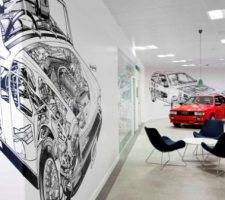November 13, 2014
Case Study: AutoTrader motors into its new Manchester digital playground
 Even in the context of a rapidly declining print market, the decision to end AutoTrader’s 37-year history as a printed magazine was not an easy one to take. At its height, Auto Trader had a circulation of 368,000, but in June 2013 the final printed copy rolled off the presses and the business began its new incarnation as a purely digital platform. Of course, this transformation was a long time in the making and had actually begun ten years earlier. By the time the print room lights went out, all of Auto Trader’s revenues had not only migrated online, but experienced significant growth too. It is Auto Trader’s growth during this process of transformation that is considered so unique in the publishing world and is proof that the business’ aspiration to be at the forefront of the digital marketplace is not just a wide-eyed intention. The website boasts 11.5million unique users, carrying out more than 140 million searches across mobile, table and desktop devices and the business is set to launch an extensive TV advertising campaign on boxing day.
Even in the context of a rapidly declining print market, the decision to end AutoTrader’s 37-year history as a printed magazine was not an easy one to take. At its height, Auto Trader had a circulation of 368,000, but in June 2013 the final printed copy rolled off the presses and the business began its new incarnation as a purely digital platform. Of course, this transformation was a long time in the making and had actually begun ten years earlier. By the time the print room lights went out, all of Auto Trader’s revenues had not only migrated online, but experienced significant growth too. It is Auto Trader’s growth during this process of transformation that is considered so unique in the publishing world and is proof that the business’ aspiration to be at the forefront of the digital marketplace is not just a wide-eyed intention. The website boasts 11.5million unique users, carrying out more than 140 million searches across mobile, table and desktop devices and the business is set to launch an extensive TV advertising campaign on boxing day.
























October 21, 2014
Orgatec preview: the next generation workplace is all about settings
by Justin Miller • Comment, Events, Products, Workplace design
There is a well travelled international circuit for those interested in what office design tells us about the way we work that has, for a number of years, taken in London, Milan, Chicago, Stockholm and Cologne as its main stopping off points. This week sees the launch of Orgatec, the longstanding biennial workplace festival in Cologne. One of the interesting features of Orgatec is that, because it takes place every two years, it offers snapshots of key developments in the market. It throws a spotlight on whatever workplace professionals are talking about and whatever product designers are doing in response to the changing world of work. And it does it on a big scale. This year over 600 companies from 40 countries will be presenting across an exhibition area of 105,000 sq. m. This seems big, and is, but is down markedly on the size of the show from 20 years ago when Orgatec was the launch pad for seminal products such as Herman Miller’s Aeron Chair and the Ad Hoc furniture system from Vitra.
(more…)